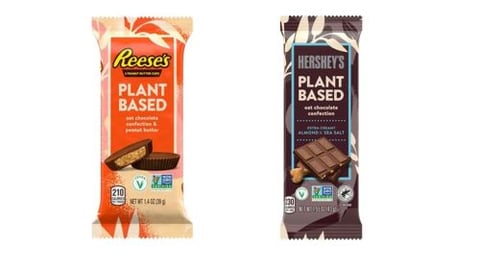Kroger's Roadmap for Driving Plant-Based Sales
The Kroger Co.'s data science arm, 84.51°, unveiled new research at the recent Natural Products Expo West show in Anaheim, California, detailing the behavior of omnichannel plant-based shoppers, and how grocers can shape their marketing and merchandising strategies to grab more sales from these consumers.
Julie Emmett, VP of marketplace development for the Plant Based Food Association (PBFA), led a panel discussion with Shannon Weis, lead consultant/insights account manager at 84.51° and PBFA consumer insights analyst Linette Kwon, where they presented new research to be published in April. The 12-week e-commerce study looked at 10 plant-based subcategories, animal-based meat, understanding the path to purchase on online shopping, the entry points, how consumers interact with various plant-based categories, and how consumers search for plant-based foods online.
[Read more: "FDA Offers Draft Guidance for Labeling Plant-Based Milk Alternatives"]
According to PBFA, 66% of the total adult U.S. population is engaged with plant-based foods, which demonstrates the size and potential of the category.
"We started out on our mission to really understand what are the unmet consumer needs in plant-based foods, and it all starts with the data," Weis said. "We leveraged our first-party retail data of 60 million households with over 2 billion annual transactions. That's one out of every two households in the U.S."
84.51° targeted the top 50% of spenders in plant-based meats, cheese and milk categories.
"Our participants ranged in age from 25 years old to 64 years old. About 78% of them were female and were the primary plant-based consumer as well as the primary shopper, grocery shopper in the household," Weis said.
What They Like
When asked what they like most about plant-based foods, consumers cited health benefits most.
"Across age groups, health benefits was the number one driver to plant-based foods," Kwon said. "But if you look at animal cruelty, you can see that it was especially high for consumers age 25 to 34 and 45 to 54, whereas taste and flavor was also something consumers really liked about plant-based foods. But it was especially high for consumers age 35 to 44."
But Kwon noted the data shows the plant-based industry isn't growing faster because consumers aren't satisfied with taste.
What They Dislike
The study also asked consumers what they dislike most about plant-based foods.
"Overall, consumers dislike the consistency and texture most, followed by the high price, but there are age group distinctions," said Kwon. "Consistency and texture was the biggest dislike for consumers age 35 to 44. Well, for the youngest consumers age 25 to 34, the biggest dislike was the high price."
Interestingly, the more health-related dislikes, such as "too processed" and "too much sodium" were the biggest dislikes for consumers age 55 to 64.
By examining both the likes and dislikes, it's clear that consumers want nutrient dense foods with better texture and maybe more variety of flavors, Kwon said.
One common theme in the research was that consumers do not like the amount of additive ingredients and excessive sodium in plant-based products.
The data also showed that consumers are still unhappy with the taste and texture of plant-based cheese, noting that it tastes plastic or unnatural and has a grainy texture. They want cheeses that taste better, melts well and have a creamy texture.
"One consumer said, 'I wish there was a better plant-based cheese alternative that tasted like regular cheese, melted well and didn't have a grainy texture.' And 73% overall agreed," Kwon said.
Solving Unmet Needs
Kwon then offered thought starters and innovative ideas to help solve the unmet needs of the plant-based consumer.
"Consumers want to see more exciting and bold flavors, by bold flavors, different kinds of seasonings but really different types of foods. So not just your standard American foods but maybe foods from different cultures like Thai food," Kwon said.
And they also want to see plant-based options for familiar foods like tamales, enchiladas, and mac and cheese.
"Consumers also want to see more healthy plant-based options for pre-made meals, whether they're frozen or not, just having more options with improved convenience and accessibility. And consumers want to see advancements in plant-based cheese for better taste, texture, and ability to melt," Kwon said. "Consumers also find it difficult or time-intensive to prepare or consume plant-based meals. Convenience is very important to these shoppers. So developing more foods and meals that are easy to prepare and easy to consume on the go could address this."
Finally, many plant-based foods are still hard to find in stores and markets.
"When they are found, it's not consistent from store to store," said Kwon. "So placing plant-based foods alongside their animal counterparts would not only make it easier for plant-based consumers to find them, but it could also reach a broader range of consumers who maybe didn't have the intention of buying plant-based foods. But by simply placing them there, we increase visibility and give them the option."
Weis said that PBFA conducted an in-store test in the Kroger meat department back in 2019, in which all of the plant-based meat items were moved to the animal-based meat set.
"And what we found using our test versus control methodology is that there was a 23% sales increase in those 60 stores that were tested," she said. "And that was a proof of concept that was validated, and we were able to roll out the integrated segregated set where the animal-based products and their plant-based counterpart products were integrated and next to one another in store. So that was a big impact, I think, in a good way for the plant-based foods."
Serving 11 million customers daily through a digital shopping experience and retail food stores under a variety of banner names, Cincinnati-based Kroger is No. 4 on The PG 100, Progressive Grocer’s 2022 list of the top food and consumables retailers in North America.











